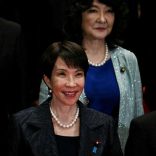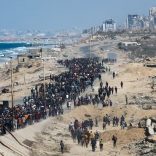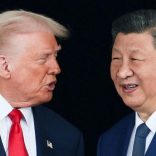EU seeks to relax rules on turning away asylum seekers
Macau: World Press Photo laments Hong Kong protest image blackout, exhibition prematurely closed

Image: MNAMacau
The World Press Photo Foundation on Thursday lamented the ‘blackout’ in Macau of an exhibition showing images of protests in Hong Kong.
In a response sent to Lusa, the exhibition director of the World Press Photo Foundation, based in Amsterdam, said that several days after the exhibition had been closed prematurely, without warning, it was still unclear why the exhibition organised locally by the Casa de Portugal had closed and stressed the importance of freedom of expression in the work the foundation does.
“Although the reasons for the closure remain unclear, we are following local news suggesting that it may be the result of external pressure on the content of the exhibition” which brings together “the best of last year’s visual journalism”, said Laurens Korteweg.
“Supporting the conditions for freedom of expression, freedom of research and freedom of the press is a fundamental part of our work. We lament the premature closure of our annual exhibition in Macau. Our collaboration with Casa de Portugal Macau has always been positive and we look forward to returning to Macau”, he added.
The foundation also stressed that “all the award-winning photographs in the individual categories are exhibited and a selection of images are made for all the award-winning stories” and that “the content of the World Press Photo annual exhibition is the same for all exhibition locations and partners cannot choose which images to include in the exhibition”.
The exhibition opened on 25 September and was due to run until 18 October, but last weekend the doors were closed without notice.
The president of Casa de Portugal, the association that has organised the exhibition in Macau for years, contacted by Lusa, failed to explain the reasons for the closure of the exhibition. Amélia António simply said that “internal management issues are not to be discussed in public”.
The English and Portuguese speaking Press Association of Macau (AIPIM) also regretted the early closure of the World Press Photo exhibition in Macau “for reasons still to be clarified”.
“If the closure is related to pressures around some of the exhibition’s photographs, AIPIM considers that we are facing something serious and a worrying episode that signals an erosion of the space for freedom of expression”, the association pointed out, adding that “the World Press Photo exhibition brings together the best photojournalism in the world and that the presence of this exhibition in Macau over the last few years has been prestigious for the city, valuing the projection of quality photojournalism and freedom of the press”.
The only Portuguese member of the Legislative Assembly, José Pereira Coutinho, said in a statement to Lusa that “it is clear that the president of Casa de Portugal suffered pressure to end the exhibition” and “it is clear that it was because of the images of the protests in Hong Kong”.
Another parliamentarian, Sulu Sou, also from the pro-democracy camp, said the case raises many questions which, if not answered by the government, may lead the public to question whether it was not political censorship.
The youngest member of parliament in Macau has also pointed out that it has been the scene of some ‘coincidences’, such as the case of the ban on an exhibition on the Tiananmen massacre.
“We don’t want to see any more of these activities being stopped in Macau,” he said, adding: “Freedom and human rights are like the air, if we lose it we die.
Au Kam San told Lusa that “if the closure of the exhibition is related to the photos alluding to the protests in Hong Kong” then this “absolutely should not happen”.
The Macau Foundation, through which the Government sponsored the exhibition, limited itself to stating, in a response to Lusa, that it was aware of the early closure of the exhibition “because of an internal management problem at Casa de Portugal”.
As in Hong Kong in 1997, a period of 50 years with a high degree of autonomy, at executive, legislative and judicial level, was agreed for Macau in 1999. The formula ‘one country, two systems’ was originally proposed by Chinese leader Deng Xiaoping in the late 1970s as a solution to reunifying Taiwan.












Leave a Reply
Be the First to Comment!
You must be logged in to post a comment.
You must be logged in to post a comment.